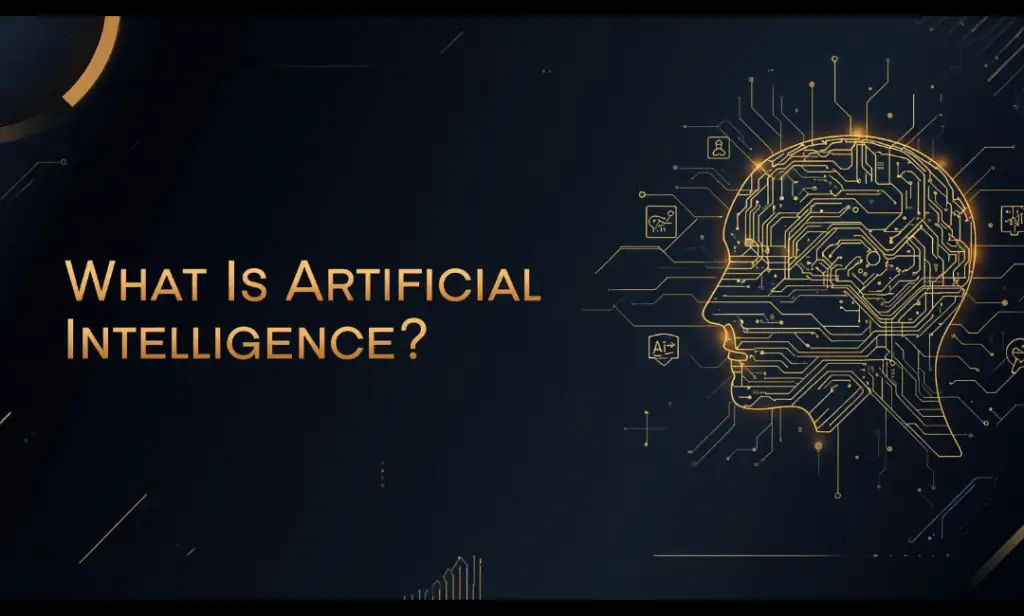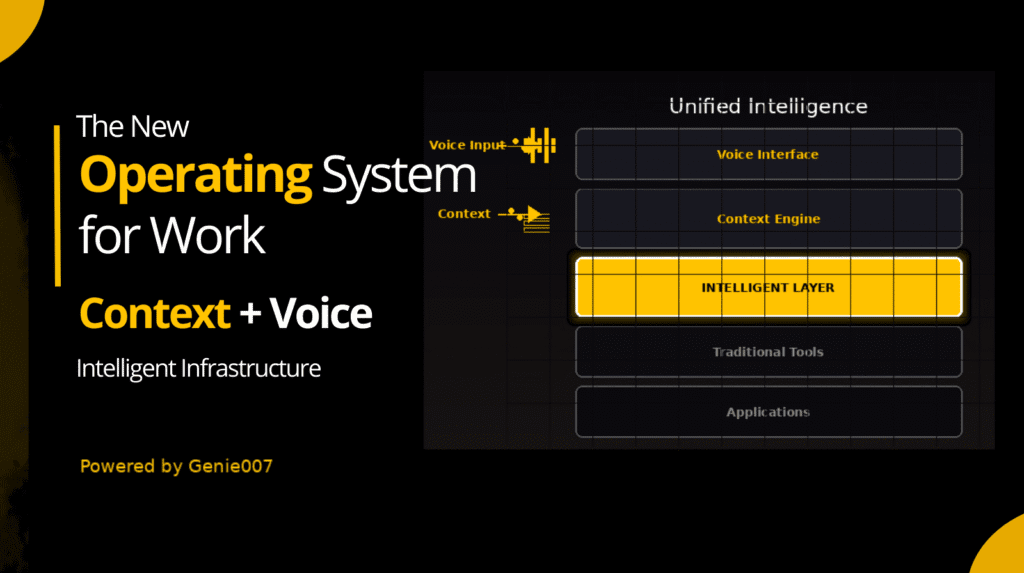Artificial Intelligence (AI) is no longer a futuristic concept. It’s the invisible engine powering many of the technologies we use daily — from recommendation systems and navigation apps to automated chatbots and voice assistants like Genie007.
At its core, artificial intelligence enables computers to think, learn, and act in ways that mimic human intelligence. Instead of being limited to static programming, AI systems can interpret data, make predictions, and even improve with experience.
Today, AI is transforming industries, communication, and the way we interact with technology. To understand its impact, let’s explore what AI really is, how it works, and why it’s shaping the next generation of productivity tools.
Defining Artificial Intelligence
Artificial intelligence refers to the simulation of human intelligence in machines. These machines are programmed to perform tasks that typically require human cognition, such as learning, reasoning, perception, and decision-making.
Unlike traditional software, AI adapts. It evolves based on new data and experiences. Modern AI systems use algorithms inspired by how the human brain processes information — especially neural networks, which are at the core of machine learning models.
The Evolution of Artificial Intelligence
AI’s journey began decades ago, long before it became mainstream.
| Era | Key Development | Example |
|---|---|---|
| 1950s–1970s | Early AI concepts and algorithms | Turing Test, Logic Theorist |
| 1980s–1990s | Machine learning and expert systems | IBM’s Deep Blue |
| 2000s–2010s | Big data and neural networks | Siri, Google Assistant |
| 2020s–Present | Generative AI and voice productivity | Genie007, ChatGPT |
Over time, AI evolved from rule-based automation to context-aware systems capable of reasoning and creativity. Today’s AI can generate text, design graphics, and even hold conversations that sound human.
The Core Branches of Artificial Intelligence
Artificial intelligence is a broad field made up of several branches that work together to create intelligent systems.
1. Machine Learning (ML)
Machine learning allows computers to learn from data without explicit programming. For example, Genie007’s speech recognition model improves each time it processes voice input, learning new tones, accents, and sentence structures.
2. Natural Language Processing (NLP)
NLP enables AI to understand and generate human language. Genie007 uses NLP to interpret speech and transform it into coherent text. It recognizes intent, emotion, and context to ensure every output sounds natural.
3. Computer Vision
This branch gives machines the ability to “see.” Computer vision powers facial recognition, image classification, and object detection systems. While Genie007 focuses on voice, similar AI technologies help cameras analyze environments or read documents.
4. Deep Learning
Deep learning uses neural networks modeled after the human brain. These layers of interconnected nodes help AI make complex predictions, from voice transcription to real-time decision-making.
5. Robotics and Automation
AI-driven robots use sensory data and intelligent programming to perform physical tasks — from warehouse logistics to medical surgery. Combined with voice AI, these systems represent the next step in human–machine collaboration.
How Artificial Intelligence Works
AI systems function through three core stages: data collection, learning, and execution.
- Data Collection: AI models are trained using vast datasets — voice recordings, text, or images — to identify patterns.
- Learning: Machine learning algorithms analyze this data to form rules and predictions.
- Execution: The AI applies what it has learned to perform tasks such as writing, predicting trends, or responding to voice commands.
For instance, Genie007 listens to your voice, understands your command through NLP, and generates written output instantly. It combines AI models for speech recognition, context analysis, and text creation, all in one seamless workflow.
The Real-World Applications of Artificial Intelligence
Artificial intelligence has become an essential part of modern life, supporting industries across the globe.
| Industry | AI Application | Example of Use |
|---|---|---|
| Healthcare | Diagnosis assistance and medical imaging | AI detects patterns in scans faster than humans |
| Finance | Fraud detection and algorithmic trading | AI predicts transaction anomalies |
| Marketing | Personalized advertising and content creation | AI tailors campaigns based on behavior |
| Customer Service | Automated chat and voice support | 24/7 intelligent helpdesk responses |
| Education | Personalized learning platforms | AI tutors adapt to each student |
| Content Creation | Voice assistants and writing tools | Genie007 helps professionals produce content faster |
Each use case highlights how AI improves decision-making, creativity, and efficiency. Genie007 stands out for making this power accessible to everyday professionals — no coding or setup required.
AI and Human Productivity: The Genie007 Example
AI’s greatest strength is enhancing human capability. Genie007 does this by enabling hands-free productivity.
Instead of spending hours typing reports or crafting posts, users can simply speak. Genie007 translates voice input into well-written, contextually accurate text. It also formats, edits, and optimizes content for clarity.
The result is faster output, reduced fatigue, and improved communication quality. Professionals, marketers, and entrepreneurs use Genie007 to manage emails, write articles, summarize documents, and translate text into over 140 languages — all with voice.
Types of Artificial Intelligence
AI can be categorized into three levels based on capability:
| Type | Description | Example |
|---|---|---|
| Narrow AI | Designed for specific tasks | Genie007 for voice productivity |
| General AI | Mimics human-level intelligence | Still theoretical |
| Super AI | Surpasses human intelligence | Future potential, not yet achieved |
Genie007 represents narrow AI — highly efficient at performing specific language and productivity-related functions.
Ethical and Privacy Considerations in AI
As AI grows, so do concerns about privacy, bias, and data ethics. Responsible AI development requires transparency, fairness, and user control.
Genie007’s local-first processing model ensures that users retain ownership of their voice data. Speech is analyzed securely within the browser, and recordings are not stored or shared without permission.
Ethical AI also involves continuous testing for fairness, ensuring outputs remain unbiased and inclusive across languages, genders, and accents.
Artificial Intelligence vs Human Intelligence
While AI can process vast amounts of data, it still lacks emotional understanding and creativity at a human level.
| Aspect | Artificial Intelligence | Human Intelligence |
|---|---|---|
| Speed | Processes information rapidly | Slower but more nuanced |
| Creativity | Generates based on patterns | Innovates through emotion and imagination |
| Learning | Data-driven | Experience-driven |
| Emotion | Lacks empathy | Deep emotional understanding |
The goal isn’t for AI to replace humans, but to augment them. Tools like Genie007 amplify human creativity by handling repetitive work, allowing professionals to focus on strategy and ideas.
The Future of Artificial Intelligence
The next wave of AI will focus on contextual understanding and personalization. Systems will not only respond to commands but anticipate needs — predicting what users want before they ask.
For Genie007, this means developing more proactive capabilities:
- Predicting content tone based on the reader’s audience.
- Suggesting communication improvements automatically.
- Integrating seamlessly with productivity tools like Gmail, LinkedIn, and Slack.
Future AI assistants will feel less like tools and more like collaborators — adaptable, insightful, and intuitive.
Benefits of Artificial Intelligence
Artificial intelligence offers several measurable advantages for businesses and individuals:
- Efficiency: Automates time-consuming tasks.
- Accuracy: Reduces human error.
- Scalability: Handles large datasets effortlessly.
- Creativity Support: Assists in writing, design, and communication.
- Accessibility: Helps people with disabilities work more effectively.
Genie007 embodies all of these benefits through a single browser-based assistant designed to simplify the digital experience.
Key Takeaways
- Artificial Intelligence enables machines to think, learn, and act like humans.
- Genie007 uses AI to transform voice into productivity through speech recognition and contextual understanding.
- AI impacts every industry — from healthcare to marketing — by enhancing speed and accuracy.
- Ethical AI practices like privacy-first design ensure trust and security.
- The future of AI lies in personalization, proactive learning, and seamless human collaboration.







